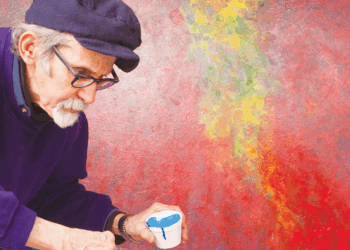Reviewed by NEAL GENDLER
For understandable reasons Sam is not a happy girl, so Allegra Goodman’s very engaging Sam is not a happy story.
Told without pity but with compassion, it’s hard to clear from your mind and mood.
In a solo-parent home, Sam lacks money. She also lacks friends. She dislikes school. She has nothing to do with her classmates — who value wearing the right shade of jeans — but she’s a math whiz.
What she likes is climbing, which starts with a front-yard beech tree and inching up between doorways of their unfinished house.
After a policeman orders her off a back wall of a church, Sam’s mother Courtney asks why she climbs.
“Because it’s hard,” Sam replies.
Goodman writes: “Sam doesn’t know any other way to say it. It’s not the danger. It’s that climbing is so hard. She loves how difficult it is.”
Climbing will lead Sam to a too-brief close friendship, to intense but failed romances and to a small circle of laid-back climbers.
If Sam had a standard family, it would be considered dysfunctional.
What Sam has at age seven, when the book begins, is Courtney, her worldly hairdresser mother, determined that Sam will finish college, which pregnancy with Sam forced her to quit.
She has two-year-old Noah, her brother, who will grow to be a problem — angry, avoiding homework and interested only in computer games and hockey, at which he excels.
Sam occasionally has two men in her life: affectionate Mitchell, her fun-loving, performing father, who lives nearby but often is away; and hostile Jack, Noah’s father, a large, heavily tattooed construction worker with a short temper.
At one point, Jack is between jobs and moves in with tools to work on the house, which his mother had bought as an investment.
Courtney and Jack love each other but fight. Jack and Sam despise each other. Mitchell despises Jack and calls him a no-good liar. In a fight, Sam bites Jack. He throws her out in the cold and locks the door.
Courtney tries to hold things together, barely paying the bills and keeping both men at length. She’s tired — even more after Jack is violent and she takes a second job so she can rent an apartment. Now she’s working seven days a week.
There are Jews in this story; they’re surprises.
Sam isn’t totally a story of poverty and partially self-imposed loneliness, but I found the first half of the book as depressing as Joyce Carol Oates’ Them, which I foolishly read decades ago during a long flight.
Many of us know Sam’s feeling of not fitting in. Growing up in a town of 18,000 with seven Lutheran churches, I didn’t lack friends, but in each of my classrooms, K-12, I was the only Jew.
Sam’s isolation softens when she meets talented, beautiful Halle at a YMCA climbing wall. They enroll in a Saturday competitive climbing program and become close. Halle’s parents let Sam sleep over Fridays and drive them to climbing.
But Halle, bored by her classes, enrolls in a more demanding school 40 miles distant; she and Sam drift apart.
Sam starts high school friendless. She works to help with expenses. When she turns 18, she’s given her grandmother’s baby blue Buick, which she’ll drive to an area called Red Rocks.
There, she falls in with a band of climbers a few years older, none as competent nor ambitious as Sam becomes. Battered and bruised, she completes a near-impossible climb.
Along the way, she has her first boyfriend — nice but no bargain.
“He likes her, and she thinks less of him for that. She thinks less of herself, too, because he’s crazy.”
About three-quarters of the way in, Goodman starts lifting the clouds: Reluctantly giving in to Courtney’s demands, Sam thrives on new difficulties propelling her to a better life.
Goodman tells this tale sparely, short sentences reflecting Sam’s terse speech. Except for Sam, we don’t get far into anyone’s head — just enough to surmise emotions.
Sam is the ninth book by award-winning Goodman, who also has appeared in newspapers and magazines and has a Stanford doctorate in English literature. Sam is an unusual, poignant story that sticks with you.
***
Neal Gendler is a Minneapolis writer and editor.
(American Jewish World, February 2023)



















